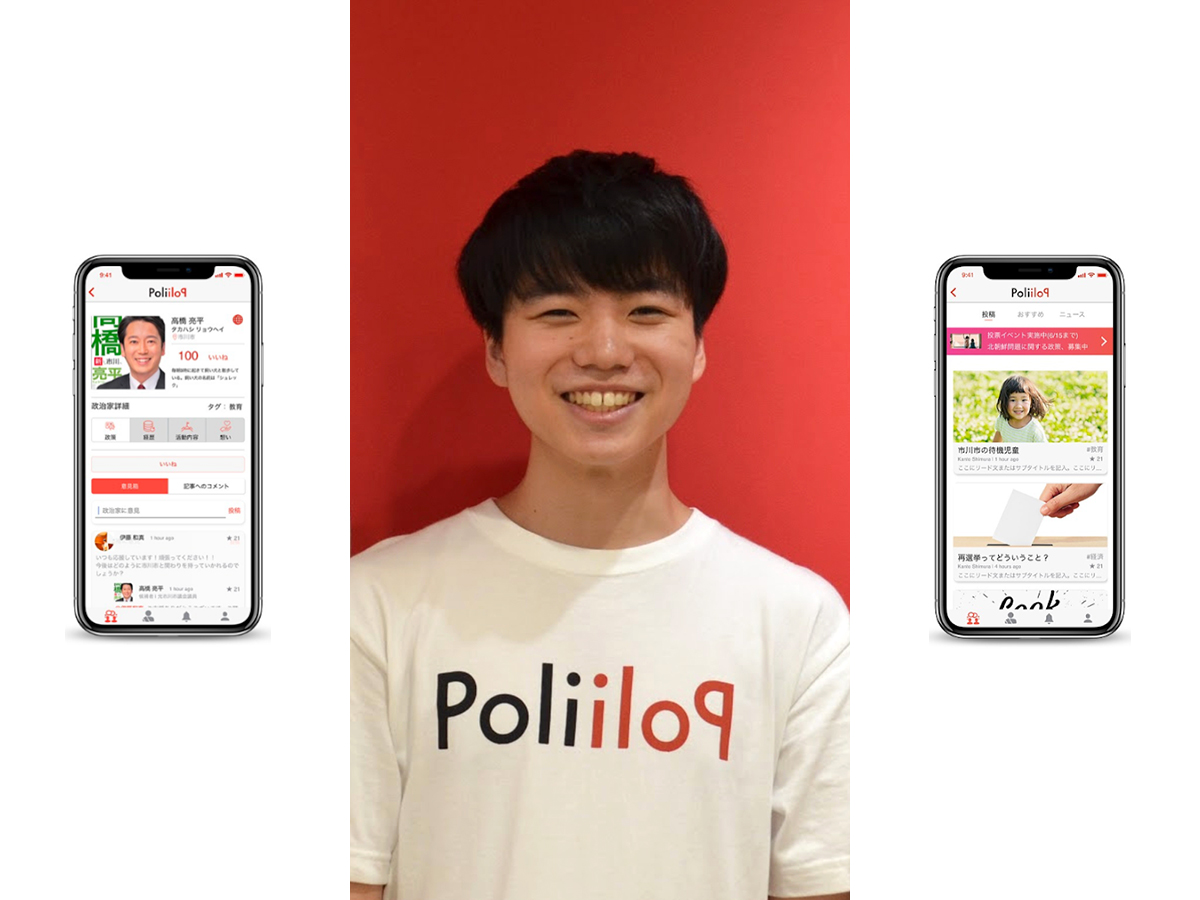- Source:
- © PR Times, Inc.
- Tags:
- App / Kazuma Ito / PoliPoli / Politics / Voting
Related Article
-

“MICHICON-PLUS” App Gives Vtubers Full Body Motion Capture with VRoid Models [Video]
-

Japanese Student Translates Trump Tweets For English Practice, Learns The Best Words
-

Japan pressures China over Uighur crackdown while residents support the Muslim minority
-

Cat Collector! Love Cats? Assemble A Household Of Adorable Kitties With This Cute Japanese Smart Phone App!
-

Guide to the rainy season in Japan: What are the best “Tsuyu” apps?
-

You Can Now Vote For (And Create) A New Japanese Kit Flavor That Will Be Released Internationally



Changing the political system with an app
What were you doing when you were 19? If you were anything like me, you had a menial job, a few tough college classes, and a party to go to now and then. 19-year-old Kazuma Ito, on the other hand, is a published poet. He also runs his own business. He is best known as the CEO of PoliPoli, a political app he and his friends developed. Although politics aren’t particularly hip within his demographic, Ito and his classmates recognized voters and politicians rarely engage in direct communication. PoliPoli aims to fix that.
“The system of politics must be changed," says Ito. The app works to spread information from voters to politicians and vice-versa. Politicians create a profile showcasing their experience and their platform. With a built-in bulletin board, citizens can directly ask questions. The app's mission is to allow discussion of the little things — dilapidated bridges, potholes in the road, and other issues that directly effect voters' lives [1]. In short, PoliPoli hopes to foster a more engaged body politic.
© PR Times, Inc.
A herculean task
Ito and co. have their work cutout for them. Although Japanese citizens are reliable voters, the July Upper House election saw a turnout of 48.80%, down from 54.70% in 2016. That’s the second-lowest number since WWII. The lackluster turnout was likely due to a lack of public attention during the last campaign cycle. Candidates failed to distinguish themselves, and voters noticed. Or rather didn't. Torrential rain may have also kept some voters from the polls [2].
Although the voting age was lowered in 2016 from 20 to 18 [3], young voters were a significant component of this low participation rate. About 45% of voters age 18 to 19 participated in 2016. The same figure was 31.33% in July, a drop of 15 points. While registration issues deserve some of the blame, voter apathy has been creeping up during Prime Minister Abe’s tenure. Despite numerous scandals involving the leader, the opposition coalition has been unable to organize an effective challenger. There is little oxygen for a populist movement.
Getting young Japanese involved
Young people may also have trouble comprehending the differences between candidates and policies. Students in Japan are not well-versed in their political system. Political education is considered taboo, and teachers are prohibited from expressing political views in the classroom. For many teachers, it's a delicate line to walk so they gloss over the topic altogether. It probably doesn’t help that, historically, the teachers' union in Japan was associated with the Communist Party.
Recently, Japan's education minister found himself amid a Twitter backlash. The outgoing minister tweeted about changing English requirements for entrance exams. In the comments of his tweet, a discussion between a teacher and high school student developed. The teacher ended their exchange by encouraging the student to convince his or her friends to vote against Abe. The student responded that he or she often talked politics during lunch, but felt students would decide for themselves.
In Japan, minors are prohibited from political campaigning. With this in mind, the minister suggested that the exchange was illegal. He also implied that the student was electioneering during school hours. Naturally, the minister was accused of stifling the political discussion of teenagers. Other critics ridiculed the minister's interpretation of the law [4].
Considering such fanfare, students are understandably uncertain about their political role. Some claim they don’t know where to start studying political issues; others say they don’t know how to choose a candidate. Inane online advice sometimes suggests students choose a politician based upon appearance. Everything considered, it's not surprising that young voters feel apathetic. It’s also hardly shocking that they support the status-quo when they do participate [5].
Several recent campaigns have attempted to galvanize young voters. Like any initiative in Japan, the Komeito party released an internet-savvy mascot, Komesuke. A play on the Japanese word for rice, kome, the giant grain encourages youth turnout via its Instagram page [6]. The LDP also released a comic book centered on voting's more romantic side. In the story, a female protagonist catches the eye of a crush by hitting the polls. Although there was some criticism, the comic experienced some success.
On television and online, a viral video featuring senior citizens had a peculiar message: “Dear young people, don’t vote.” Based upon the age-old knowledge that youth don’t listen to their elders, the short piece prods younger voters. “Don’t worry, Japan is a peaceful place,” one actor placates. “Climate change? This won’t bother us for another 20 or 30 years, so I don’t care,” chides another [7].
Tokenization to engage users
But it may all be for naught. Despite these initiatives, young people did not respond. How can a small company like PoliPoli hope to make a difference? For Ito, the answer lies in tokenization of his platform.
PoliPoli is well aware of the contentious dialogue that surrounds politics. As such, PoliPoli introduced rewards to users who meaningfully engage in the app. Users who start or participate in meaningful dialogue will receive Polin tokens. Politicians can also earn tokens for amassing "likes." As the token is established and liquidity develops, PoliPoli users will be able to trade them or donate them to politicians they support. To keep the environment congenial, trolling and inflammatory language will not garnish tokens [1].
Tokenization is becoming an increasingly popular method of engaging users. Messaging behemoth LINE is in the processing of establishing a token economy that could incorporate several aspects of online activities (content consumption, job searching, etc.). There may be a path forward in this space.
The notion of tokens, however, still seems like a gimmick in Japan. Considering that the country's elderly by far hold the most political sway, the idea will likely take time to catch on. It's hard to imagine senior citizens trading digital currencies on smartphone apps. Yet, the successful implication of PoliPoli could galvanize grassroots level participation in government. In the world’s 3rd largest economy, this could have a reaching effect.
Note from the editor: Kazumi Ito's age (19) is accurate at time of writing. He turns 20 on December 22, 2019